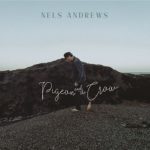 If you want reference points for “Pigeon and the Crow”, I’d go for something between “Sweet Baby James” and “Graceland”. It has the simple, laid-back feel of James Taylor and the experimental rhythms and instrumentation of Paul Simon’s classic. There’s a lot going on, but it never feels cluttered or claustrophobic. There’s something that sets this album apart from the two classics, and it’s the lyrical invention of Nels Andrews’ songs, which are mostly allegorical and metaphorical rather than following straight-line narratives and it makes for a very interesting mixture. It’s a compulsive and beguiling set of songs. And before we move away from the comparisons, you could say that there are hints of Jackson Browne, and Nels’ voice at times sounds a lot like Ian (or Iain) Matthews at the time he was trying to crack the American market in the seventies.
If you want reference points for “Pigeon and the Crow”, I’d go for something between “Sweet Baby James” and “Graceland”. It has the simple, laid-back feel of James Taylor and the experimental rhythms and instrumentation of Paul Simon’s classic. There’s a lot going on, but it never feels cluttered or claustrophobic. There’s something that sets this album apart from the two classics, and it’s the lyrical invention of Nels Andrews’ songs, which are mostly allegorical and metaphorical rather than following straight-line narratives and it makes for a very interesting mixture. It’s a compulsive and beguiling set of songs. And before we move away from the comparisons, you could say that there are hints of Jackson Browne, and Nels’ voice at times sounds a lot like Ian (or Iain) Matthews at the time he was trying to crack the American market in the seventies.
The press pack for the album contains a lyric sheet for the album (it’s in the album packaging as well), but also a very helpful set of writer’s notes for each song, which share the sort of detail you would never pick up on otherwise. “The Lion’s Jaws” is based on the story of an in-law who, at one time, was the only Jewish lion-tamer in history, which is an interesting coincidence, given that Scottish singer-songwriter Dean Owens (recently reviewed here) has also written about a not-too-distant ancestor who was a lion-tamer.
To get some idea of the musical variety of the album, you only need to take a look at the credits. There are thirteen musicians involved and a list of fourteen instruments (not including the many under the umbrella of percussion) from various musical traditions including kora, steel pan, harmonium and flute; it’s not just a lot of instruments, it’s a lot of musical styles melding together seamlessly by producer, flautist and singer Nuala Kennedy.
Highlights? The title song’s hard to beat, with its supernatural love story theme and its lilting Gaelic feel; the opener “Scrimshaw” in triple time and with mid-life memories of happiness and regrets is a perfect evocation of the singer-songwriter genre, and the slightly rockier “Table by the Kitchen” is a fiddle-led, fear-of-missing-out anthem satirising the me generation. What remains in the memory when you reach the end of the album, is the sheer variety of musical settings used to project these songs and support Nels’ mellifluous voice and the way that none of it seems out of place.
“Pigeon and the Crow” is out now.
 When music venues are closing on what seems like a daily basis, it’s heartening to see the success of places like The Finsbury. It’s taken a few years of building and investment, but The Finsbury’s now well established on the small gig circuit delivering a programme of music and comedy seven days a week. Which brings us to an excellent triple bill on a wintry Tuesday night in March featuring Brian Grogan, Ringlefinch and The Eskies; it wasn’t a packed house, but the enthusiasm of the crowd and the bands more than made up for that.
When music venues are closing on what seems like a daily basis, it’s heartening to see the success of places like The Finsbury. It’s taken a few years of building and investment, but The Finsbury’s now well established on the small gig circuit delivering a programme of music and comedy seven days a week. Which brings us to an excellent triple bill on a wintry Tuesday night in March featuring Brian Grogan, Ringlefinch and The Eskies; it wasn’t a packed house, but the enthusiasm of the crowd and the bands more than made up for that.
Brian Grogan opened the evening with a set of confessional songs focussed on fears of sexual inadequacy (plus a very interesting cover) backed by a striking combination of sparkling Rickenbacker, fretless bass and cajon and some superb harmonies. With a voice that has a strong resemblance to Ian (or Iain) Matthews, he couldn’t really go wrong. And the cover; well, it was a soft-rock version of the theme from “The Fresh Prince of Bel-Air”, with a few snippets from other tunes thrown in to create a live mash-up. Mad idea, really, but it worked.
Ringlefinch were next up, taking the tempo and volume up a few notches before the headliners with a bunch of songs full of lyrical invention and interesting arrangements featuring mandolin, resonator bass, ukulele, banjo and guitar. All good fun and topped off with a lively cover of Tom Lehrer’s “Masochism Tango” for good measure.
How do you describe The Eskies? Well, I asked their tour manager and he was struggling with the concept, but I’ll have a go anyway. You’ll find elements of klezmer, Gaelic folk, gypsy jazz, spirituals and American ragtime in there seasoned with a healthy sprinkling of the craic between songs. Oh, and a huge dollop of fun. Despite the raggle-taggle appearance, the musicianship was extraordinarily tight as the band navigated its way through rhythm, tempo and key changes at breakneck speed throughout their set, throwing in some exquisite four-part harmonies as well. The set leaned heavily on material from the debut album “After the Sherry went Round”, including “Fever”, “Down, Down, Down”, “Down by the River”, “Chin up Jack”, “Shame” and the current single “Jesus Don’t Save Me”. And there you go; a live set that left the audience gurning like loons and breathless with admiration. What more would you want from a gig?
If you want to catch this experience, you can still see The Eskies live during the remainder of their UK tour.


